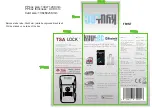
KharkovEnergoPribor Ltd. | KEP Ltd.
+380 57 393 1069
www.kep.ua | [email protected]
23
USER MANUAL
4.6.2
Locating by the utility current
When several utilities are running close together within the traced
area, return signals from wrong lines may cause false retrieval.
The problem sometimes occurs when the target line is deeper than
the wrong line carrying the return signal, and the return signal from
the wrong line is stronger than one from the target line.
The current intensity does not depend on the utility depth, and
maximum current will be detectable in the target line. The same level
of current will be detected in the target line, and the target line will be
identified easily.
When you use this technique, please be sure that the current
strength in the target line is much higher than in the adjacent utilities.
To achieve this, connect the Transmitter directly to the target line, or
use the current-control clamps. Connection through the transmitting
RP-02 frame gives less evident results.
The abrupt current change may represent branches or tie-in
connections of the utilities (if they are made of current-conducting
materials), since some current will leak thought the branches.
The first Kirchhoff’s law says that the total current inflowing in a
junction is equal to the total outflowing current. You should note,
however, that values of the current intensity near the branches will
differ from the actual values. Accurate and true measurements may
be performed within long-distance and uniform areas only.
4.7 Testing of ground plots
In order to avoid damage, the ground plots shall be tested to locate
and trace the current- conducting utilities before excavating.
4.7.1
Passive locating without Transmitter
The territory may be located in response to re-radiated power,
telephone, broadcasting signals or signals of electrochemical
prot
ection. Make tracing on the «50Hz», «100Hz», «AIR» and
«RADIO» frequencies consecutively.
Set the Tracer gain so that a half of the peak bar graph is illuminated.
Move in zigzags with the zigzag step of from 1m to 5m in one
direction, and then
– in perpendicular direction.
Increased signal strength on the peak scale shows the presence of
the utility line. To validate a target line location, perform steps
specified. Find the direction of the located utility rotating the Tracer
on vertical axis. The peak signal is generated when the Tracer plane













































